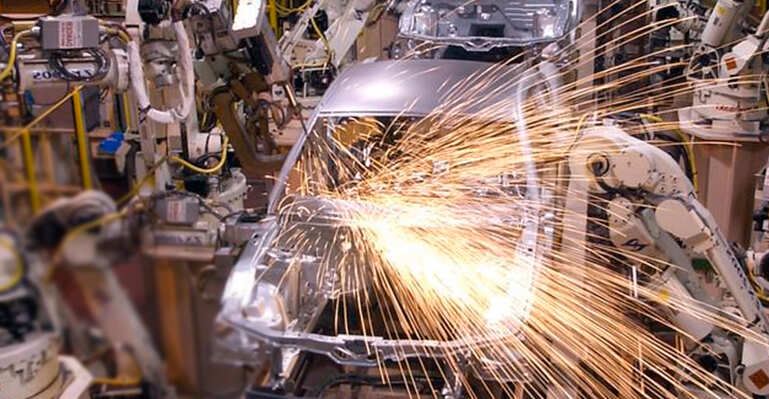
Autoworkers in continental Europe are angling to snatch Vauxhall production that owner PSA Group plans to move out of the U.K. if Prime Minister Boris Johnson follows through on the threat of a no-deal Brexit.
Vauxhall’s Ellesmere Port plant near Liverpool is in line to build an upgraded version of the Astra model, subject to a split that doesn’t wipe out profits with tariffs, component delays or a weaker pound.
With the no-deal risk rising after Johnson decided to suspend parliament, France, Spain, Germany or Portugal are poised to mop up work if an accord with the European Union can’t be reached.
“French plants could legitimately make this vehicle if a hard Brexit happens,” said Patrick Michel, a Force Ouvriere union representative at PSA, proposing the company’s Peugeot sites in Sochaux and Mulhouse as possible contenders.
U.K. carmakers have been saying since the 2016 referendum on Britain’s EU membership that a no-deal split would be a disaster. Production fell in July for the 14th straight month as exports cratered 15%, according to the Society of Motor Manufacturers and Traders.
Honda Motor Co. is already shuttering a site in Swindon that employs 3,500 people, and Nissan Motor Co. no longer plans to build the X-Trail sport utility vehicle at the country’s biggest auto plant in Sunderland.
PSA Chief Executive Officer Carlos Tavares said last month that all production will be pulled from Ellesmere Port if Brexit makes it impossible to turn a profit at a factory that has 1,000 workers and made 77,000 Astras last year. A plant in southern Europe has been earmarked as an alternative location for the new model, he said.
Spokesmen for PSA and Vauxhall declined to comment further following Johnson’s latest pronouncements.
The Paris-based group inherited Vauxhall in 2017 when it bought the carmaker’s German sibling Opel from General Motors Co., under which the U.K. business had survived intact as Opel sites including Bochum were closed.
Tavares said in June that the next-generation Opel Astra will be made at that brand’s main Russelsheim plant in Germany from 2021. The Vauxhall-badged version would be built at Ellesmere Port — conditional on the U.K.’s Brexit terms and a cost-cutting labor agreement.
The FO union’s Michel said French sites that also include one in Rennes would negotiate with management to secure the Astra, while suggesting lower-cost Spanish factories in Vigo, Zaragoza and Madrid, may be better placed. PSA has an additional plant in Mangualde, Portugal, and the Astra is also made in Gliwice, Poland, though the location is due to focus on vans.
Vauxhall already plans to cut more than 200 jobs from Ellesmere Port’s payroll. A smaller plant in Luton, where the brand is based, will benefit from an electric version of the Vivaro van from 2020, increasing its capacity to 100,000 vehicles a year and helping to safeguard it against closure.
About 80% of all cars made in the U.K. are exported, with half of those going to the EU, according to the SMMT. Britain accounts for about 10% of PSA’s global unit sales.
Where the UK’s other key auto plants stand:
Honda shocked the industry in February when it announced plans to close the Swindon site, which makes Civic hatchbacks. The news came after Nissan ended moves to build X-Trail sport utility vehicles at a Sunderland plant employing more than 7,000, and said it would stop producing upscale Infiniti cars there.
Industry under threat:
Ford Motor Co. said in June that its Bridgend engine plant in Wales will be shuttered by September next year, though the move is part of a Europe-wide retrenchment.
Jaguar Land Rover, Britain’s biggest automaker, is building the Jaguar I-Pace SUV, its first all-electric car, in Austria and shifting production of the Land Rover Discovery to Slovakia. At the same time, it’s retooling its Solihull plant to make electric versions of top-end Range Rovers and last month announced that a range of electric Jaguars will be assembled at nearby Castle Bromwich.
BMW AG starts production of an electric Mini in the U.K. this year, and has said there are no plans for any changes to its four U.K. plants.
Aston Martin Lagonda Plc, which has lowered its full-year sales forecast in response to slowing sales in Europe, opened a new factory in Wales this year to make the DBX SUV touted as the biggest driver of future sales.